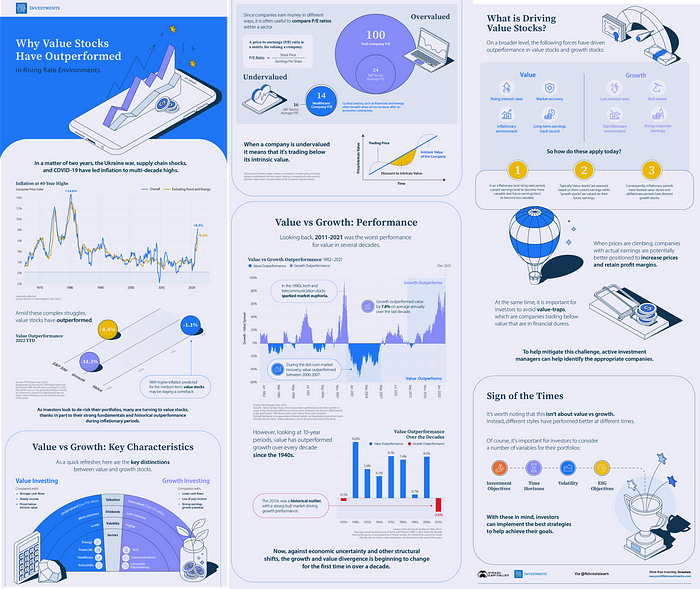Understanding Value Stocks in a Rising Interest Rate Climate
Written on
The Current Market Landscape
Despite an unexpectedly positive Non-Farm payroll report from the U.S., technology and communication sectors struggled, dragging down market performance. Most of the FAAMGA stocks, with the exception of Apple, experienced declines. The initial optimism following the Federal Open Market Committee's (FOMC) 50-basis point rate hike quickly dissipated, leading to further losses on Friday. The Nasdaq fell by 1.4%, the S&P 500 decreased by 0.6%, and the Dow Jones lost 0.3%. The week concluded with modest losses, masking a volatile environment that marked both the best and worst trading days for the Dow since 2020.
Even as investors welcomed the Fed's indication that a 75-basis point increase was off the table, concerns lingered about the Fed's capacity to tighten financial conditions to counteract inflation, which is at a 40-year high, without triggering a recession. The Dow Jones Average saw a slight weekly decline of 0.2%, marking its sixth consecutive week of losses. The S&P 500 also fell by 0.2%, while the tech-heavy Nasdaq Composite dropped 1.5%, closing nearly 25% below its peak from last November.
In the midst of all this, the benchmark dollar index (DXY) experienced significant fluctuations following the rate decision. Initially, the market responded positively to what was perceived as a dovish hike by Fed Chair Jerome Powell, who downplayed expectations of a substantial rate increase. Consequently, the U.S. Dollar weakened against many major currencies. However, as traders reassessed the implications, the Greenback regained strength, closing at 103.66 after briefly hitting 104.00.
Looking ahead, the U.S. Dollar's performance will hinge on the forthcoming inflation report scheduled for May 11th. Despite recent volatility, the dollar remains well-positioned to maintain its strength against other currencies, as the central bank continues to adopt a more hawkish stance compared to its G-10 peers. Nevertheless, a stagnant balance sheet presents challenges to any significant shift in market sentiment.
Cryptocurrency markets have also faced considerable challenges as the Federal Reserve and other central banks scale back their accommodative monetary policies. The losses in the digital asset space closely mirrored the downturn in the Nasdaq index, with Bitcoin falling below its crucial support level at $37,600, currently trading around $35,860. Ethereum has similarly declined, hovering near $2,690. Given the prevailing risk aversion, a widespread sell-off across all asset classes, including cryptocurrencies, is expected to persist.
In this environment of uncertainty, value stocks have emerged as outperformers compared to growth stocks, largely due to their robust fundamentals and consistent cash flows. As illustrated in the infographic below, this trend suggests a potential resurgence in the favor of value stocks.

China's Industrial Production Faces Challenges
As China grapples with ongoing coronavirus outbreaks and stringent lockdowns, its industrial production has suffered significantly. For the second consecutive month, both the Caixin Manufacturing Purchasing Managers Index and the National Bureau of Statistics' Manufacturing Purchasing Managers Index registered readings below 50, indicating a contraction in factory activity. The indices fell from 48.1 and 49.5 in March to just 46.0 and 47.4 in April, raising concerns about potential repercussions for global trade.
Crypto Performance Over the Last Quarter
In the past three months, Ethereum (ETH) stands out as the only cryptocurrency in CryptoCompare's asset report with positive returns, up 1.4%. Bitcoin (BTC) has remained relatively stable, down only 2.2%, while other assets have experienced steeper declines, with ADA suffering a significant 28.1% drop since February 1st.
Consumer Debt Trends in the U.S.
The Federal Reserve has reported that U.S. consumer debt is nearing a record high of $16 trillion. Notably, the growth rate of consumer debt in Q4 2021 was the highest observed since 2007, underscoring rising financial pressures. The infographic below provides a snapshot of the consumer debt landscape based on data from late 2021.
Global Oil Dependency Declines
The International Monetary Fund's chart illustrates a reduced global reliance on oil, mitigating the risk of potential economic shocks. Economists measure oil intensity by assessing how many barrels are required to generate $1 million in gross domestic product. This metric has significantly decreased compared to levels seen during the oil crises of the 1970s. Furthermore, changes in wage-setting mechanisms and the independence of central banks have contributed to this trend, enhancing the credibility of monetary policies.
Evolution of the Mobile Phone Market
The mobile phone industry has undergone drastic changes over the past 30 years. In 1993, Motorola dominated the market, holding over half of it. By 2021, however, its market share dwindled to just 2.2%. This shift is chronicled in a video by James Eagle, which details the rise and fall of various manufacturers within the mobile phone sector.
Overview of the Cloud Infrastructure Market
Amazon has consistently maintained a one-third share of the expanding cloud infrastructure market, while Microsoft has been steadily increasing its presence, claiming 22% of public cloud revenue last quarter, up from 20% the previous year. Google has also seen slight growth in its share. As industries increasingly adopt cloud computing, tech giants are fiercely competing across various domains, including cloud security and quantum computing services.
Apple's Resilience Amid Global Challenges
Following a strong finish to 2021, Apple has continued to thrive, achieving new sales and profit records. Recently, the company reported an 8.6% increase in revenue, despite facing challenges such as silicon shortages, COVID-19 disruptions, and supply chain issues. With double-digit growth in three product categories and services generating a record $19.8 billion, Apple is on track to potentially reach $100 billion in profit for the first time this fiscal year.
Market Insights: Elon Musk's Twitter Acquisition
Stay updated with significant market developments. Join my weekly newsletter for more insights like these from Faisal Khan on Medium.